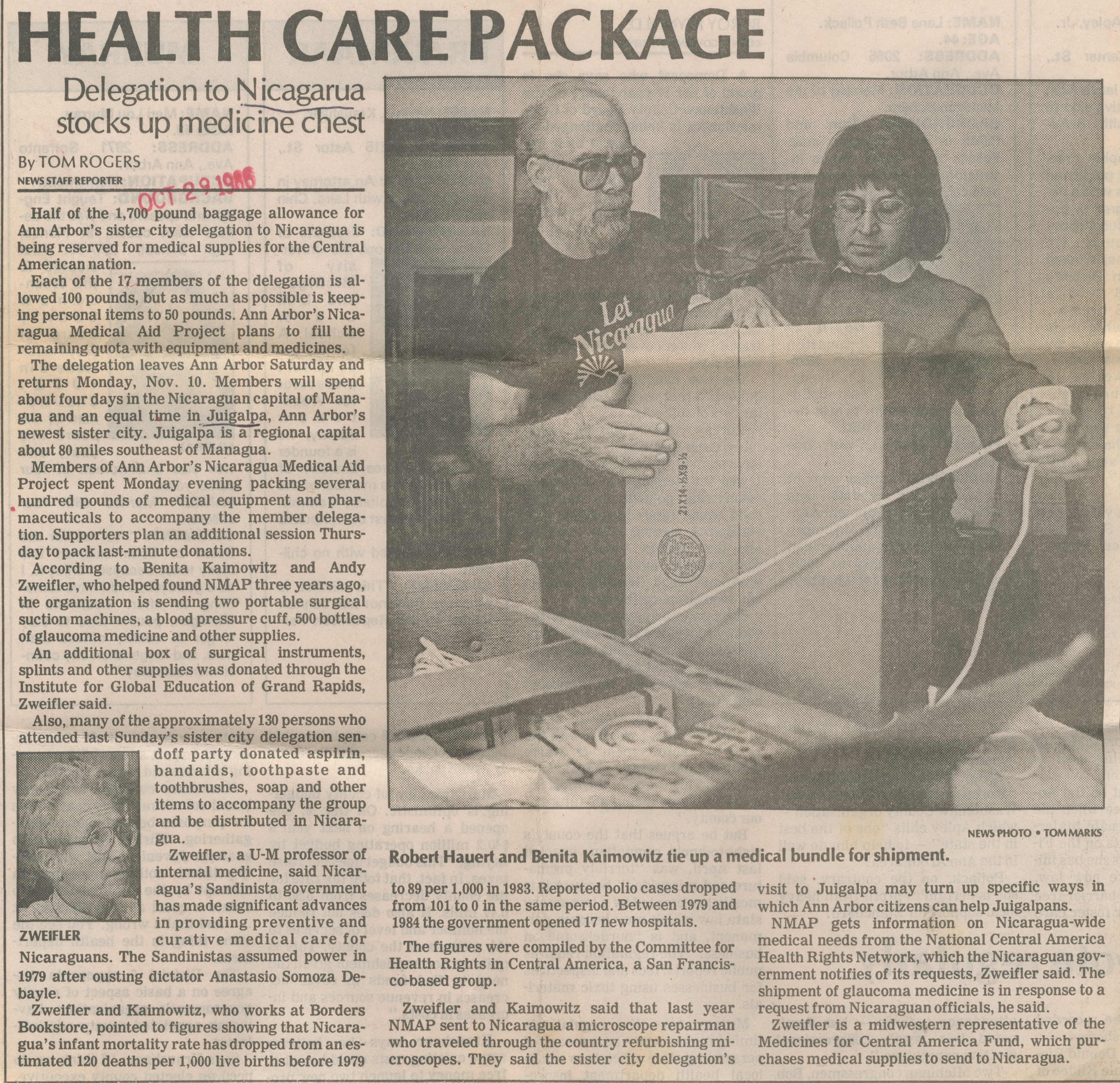Health Care Package - Delegation To Nicaragua Stocks Up Medicine Chest

HEALTH CARE PACKAGE
Delegation to Nicagarua stocks up medicine chest
By TOM ROGERS
NEWS STAFF REPORTER
OCT 29 1986
Half of the 1,700 pound baggage allowance for Ann Arbor’s sister city delegation to Nicaragua is being reserved for medical supplies for the Central American nation.
Each of the 17 members of the delegation is allowed 100 pounds, but as much as possible is keeping personal items to 50 pounds. Ann Arbor’s Nicaragua Medical Aid Project plans to fill the remaining quota with equipment and medicines.
The delegation leaves Ann Arbor Saturday and returns Monday, Nov. 10. Members will spend about four days in the Nicaraguan capital of Managua and an equal time in Juigalpa, Ann Arbor’s newest sister city. Juigalpa is a regional capital about 80 miles southeast of Managua.
Members of Ann Arbor’s Nicaragua Medical Aid Project spent Monday evening packing several hundred pounds of medical equipment and pharmaceuticals to accompany the member delegation. Supporters plan an additional session Thursday to pack last-minute donations.
According to Benita Kaimowitz and Andy Zweifler, who helped found NMAP three years ago, the organization is sending two portable surgical suction machines, a blood pressure cuff, 500 bottles of glaucoma medicine and other supplies.
An additional box of surgical instruments, splints and other supplies was donated through the Institute for Global Education of Grand Rapids, Zweifler said.
Also, many of the approximately 130 persons who attended last Sunday’s sister city delegation sendoff party donated aspirin, bandaids, toothpaste and toothbrushes, soap and other items to accompany the group and be distributed in Nicaragua.
Zweifler, a U-M professor of internal medicine, said Nicaragua’s Sandinista government has made significant advances in providing preventive and curative medical care for Nicaraguans. The Sandinistas assumed power in 1979 after ousting dictator Anastasio Somoza Debayle.
Zweifler and Kaimowitz, who works at Borders Bookstore, pointed to figures showing that Nicaragua’s infant mortality rate has dropped from an estimated 120 deaths per 1,000 live births before 1979 to 89 per 1,000 in 1983. Reported polio cases dropped from 101 to 0 in the same period. Between 1979 and 1984 the government opened 17 new hospitals.
The figures were compiled by the Committee for Health Rights in Central America, a San Francisco-based group.
Zweifler and Kaimowitz said that last year NMAP sent to Nicaragua a microscope repairman who traveled through the country refurbishing microscopes. They said the sister city delegation’s visit to Juigalpa may turn up specific ways in which Ann Arbor citizens can help Juigalpans.
NMAP gets information on Nicaragua-wide medical needs from the National Central America Health Rights Network, which the Nicaraguan government notifies of its requests, Zweifler said. The shipment of glaucoma medicine is in response to a request from Nicaraguan officials, he said.
Zweifler is a midwestern representative of the Medicines for Central America Fund, which purchases medical supplies to send to Nicaragua.
NEWS PHOTO • TOM MARKS
Robert Hauert and Benita Kaimowitz tie up a medical bundle for shipment.
Article
Subjects
Tom Rogers
Sister City
Juigalpa Nicaragua
Ann Arbor-Juigalpa Sister City Committee
Volunteers & Volunteering
Nicaragua Medical Aid Project (NMAP)
University of Michigan - Faculty & Staff
Borders Books & Music
Demographics
Has Photo
Old News
Ann Arbor News
Robert Hauert
Benita Kaimowitz
Andy Zweifler
Tom Marks